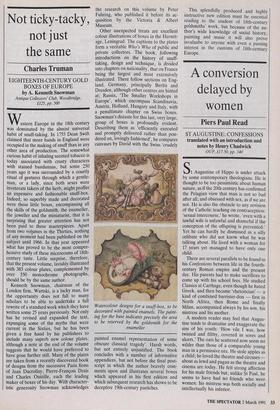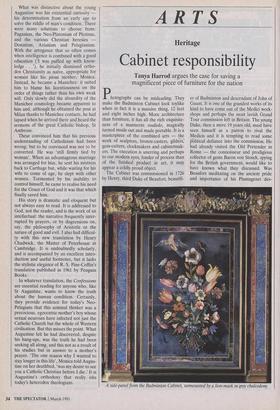A conversion delayed by women
Piers Paul Read
ST AUGUSTINE: CONFESSIONS translated with an introduction and notes by Henry Chadwick
OUP, f17.50, pp. 340
St Augustine of Hippo is under attack by some contemporary theologians. He is thought to be too pessimistic about human nature, as if the 20th century has confirmed the Pelagian view that man is not so bad after all; and obsessed with sex, as if we are not. He is also the obstacle to any revision of the Catholic teaching on contraception: 'sexual intercourse,' he wrote, 'even with a lawful wife is unlawful and shameful if the conception of the offspring is prevented.' Yet he can hardly be dismissed as a silly celibate who did not know what he was talking about. He lived with a woman for 17 years yet managed to have only one child.
There are several parallels to be found in his Confessions between life in the fourth- century Roman empire and the present day. His parents had to make. sacrifices to come up with his school fees. He studied Classics at Carthage, even though he hated Greek, and then became `rhetorician' — a kind of combined barrister-don — first in North Africa, then Rome and finally Milan, accompanied always by his son, his mistress and his mother.
A modern reader may feel that Augus- tine tends to dramatise and exaggerate the sins of his youth: 'How vile I was, how twisted and filthy, covered in sores and ulcers.' The oats he scattered now seem no wilder than those of a comparable young man in a permissive era. He stole apples as a child; he loved the theatre and circuses about as lewd and pagan as the theatre and cinema are today. He felt strong affection for his male friends but, unlike St Paul, he seems to have had no friends who were women: his mistress was both socially and intellectually his inferior. What was distinctive about the young Augustine was his existential curiosity - his determination from an early age to solve the riddle of man's condition. There were many solutions to choose from: Paganism, the Neo-Platonism of Plotinus, and the various Christian heresies — Donatism, Arianism and Pelagianism.
With the arrogance that so often comes when intelligence is combined with a good
education CI was puffed up with know- ledge . . .'), he initially dismissed ortho- dox Christianity as naïve, appropriate for women like his pious mother, Monica.
Instead, he became a Manichee: it suited him to blame his licentiousness on the order of things rather than his own weak will. Only slowly did the absurdity of the Manichee cosmology became apparent to him and, although he obtained the post at Milan thanks to Manichee contacts, he had lapsed when he arrived there and heard the sermons of the great Catholic bishop, St Ambrose.
These convinced him that his previous understanding of Catholicism had been wrong; but to be convinced was not to be converted. He was 'still firmly tied by woman'. When an advantageous marriage was arranged for him, he sent his mistress back to Carthage but, while waiting for his wife to come of age, he slept with other women. Tormented by his inability to control himself, he came to realise his need for the Grace of God and it was that which finally saved him.
His story is dramatic and eloquent but not always easy to read. It is addressed to God, not the reader, and is the work of an intellectual: the narrative frequently inter- rupted by prayers, or by disgressions on, say, the philosophy of Aristotle or the nature of good and evil. I also had difficul- ty with this new translation by Henry Chadwick, the Master of Peterhouse at Cambridge. It is undoubtedly scholarly, and is accompanied by an excellent intro- duction and useful footnotes, but it lacks the stylistic elegance of R. S. Pine-Coffin's translation published in 1961 by Penguin Books.
In whatever translation, the Confessions are essential reading for anyone who, like
St Augustine, wants to know the truth about the human condition. Certainly, they provide evidence for today's Neo- Pelagians that this seminal thinker was a precocious, egocentric mother's boy whose sexual neuroses have infected not just the Catholic Church but the whole of Western civilisation. But this misses the point. What Augustine felt he had discovered, despite his hang-ups, was the truth he had been seeking all along, and this not as a result of his studies but in answer to a mother's prayer. 'The one reason why I wanted to stay longer in this life', Monica told Augus- tine on her deathbed, 'was my desire to see you a Catholic Christian before I die.' It is Augustine's orthodoxy that really irks today's heterodox theologians.



















































 Previous page
Previous page